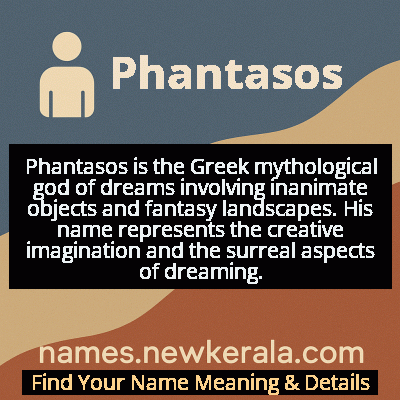Phantasos Name Meaning & Details
Origin, Popularity, Numerology Analysis & Name Meaning of Phantasos
Discover the origin, meaning, and cultural significance of the name PHANTASOS. Delve into its historical roots and explore the lasting impact it has had on communities and traditions.
Name
Phantasos
Gender
Male
Origin
Greek
Lucky Number
5
Meaning of the Name - Phantasos
Phantasos is the Greek mythological god of dreams involving inanimate objects and fantasy landscapes. His name represents the creative imagination and the surreal aspects of dreaming.
Phantasos - Complete Numerology Analysis
Your Numerology Number
Based on Pythagorean Numerology System
Ruling Planet
Mercury
Positive Nature
Adventurous, dynamic, curious, and social.
Negative Traits
Restless, impatient, inconsistent, prone to indulgence.
Lucky Colours
Green, white.
Lucky Days
Wednesday.
Lucky Stones
Emerald.
Harmony Numbers
1, 3, 9.
Best Suited Professions
Sales, marketing, travel, entertainment.
What People Like About You
Versatility, charisma, adventurous spirit.
Famous People Named Phantasos
Phantasos (Mythological)
Dream God
One of the Oneiroi who shaped dreams of inanimate objects and fantastical landscapes
Phantasos (Literary)
Mythological Figure
Featured in Ovid's Metamorphoses as creator of deceptive dream appearances
Phantasos (Modern Interpretation)
Mythological Archetype
Represented in psychological studies as embodiment of creative imagination
Name Variations & International Equivalents
Click on blue names to explore their detailed meanings. Gray names with will be available soon.
Cultural & Historical Significance
In ancient Greek culture, dreams were considered divine messages, and Phantasos represented the more abstract, symbolic dreams that required interpretation. His name derives from 'phantasia' (imagination/appearance), reflecting the Greek understanding of dreams as both illusory and meaningful. Throughout classical literature, particularly in Ovid's works, Phantasos appears as a divine craftsman of dreamscapes, embodying the creative potential of the sleeping mind. This mythological framework influenced later Western concepts of imagination and the subconscious, making Phantasos a precursor to modern psychological understandings of dream symbolism and creative visualization.
Extended Personality Analysis
Individuals named Phantasos are typically characterized by exceptional creativity, vivid imagination, and a strong connection to the subconscious mind. They possess an innate ability to see beyond surface reality, often perceiving symbolic meanings and hidden patterns in everyday life. These individuals tend to be introspective, contemplative, and drawn to artistic or philosophical pursuits. Their thinking is often non-linear, allowing them to make unique connections between seemingly unrelated concepts, making them natural innovators and visionaries in their chosen fields.
However, this rich inner world can sometimes lead to challenges in practical matters or social interactions. Phantasos-types may struggle with grounding their elaborate ideas in reality or communicating their complex visions to others. They often prefer solitude or deep one-on-one conversations over large social gatherings. Their emotional landscape tends to be complex and layered, much like the dreamscapes their namesake creates. Despite these challenges, they bring immense value through their ability to inspire others, solve problems creatively, and envision possibilities that others cannot see, making them invaluable in artistic, therapeutic, or innovative professional environments.
Modern Usage & Popularity
In contemporary times, Phantasos remains an extremely rare given name, primarily used by parents with strong interests in Greek mythology, classical literature, or unique mythological names. Its usage is almost exclusively found in academic, artistic, or intellectually inclined families who appreciate its deep mythological roots and symbolic meaning. The name has seen minimal usage in birth records, making it one of the most distinctive and uncommon mythological names. However, it has gained some recognition through popular culture references, particularly in fantasy literature and comics. Modern parents choosing this name typically value creativity, individuality, and intellectual depth, seeing it as a way to honor classical education and imaginative thinking. The name's complexity and strong mythological associations make it more suitable as a middle name in practical usage, though some bold parents embrace it as a first name.
Symbolic & Spiritual Meanings
Symbolically, Phantasos represents the realm of creative imagination, subconscious exploration, and the boundary between reality and fantasy. As the dream god of inanimate objects and surreal landscapes, he embodies the human capacity to transform ordinary perception into extraordinary vision. His symbolism extends to concepts of illusion, artistic inspiration, and the power of the mind to create realities beyond physical limitations. In psychological terms, Phantasos symbolizes the archetype of the visionary—the part of consciousness that can reconfigure reality, find meaning in abstraction, and access deeper layers of understanding through symbolic representation. He represents the bridge between the conscious and unconscious mind, reminding us that what appears as mere fantasy can contain profound truths and creative potential.

